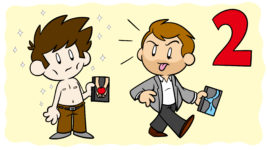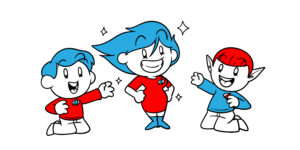Every author hopes for a large, vocal fan base, but in an age where the internet makes starting a community as easy as starting a conversation, many are finding that their readers have gone further than they ever expected.
It’s not unusual for particularly rich worlds and characters to inspire fan fiction. These stories, penned by studious fans of the originals, often take established characters and settings to do something new and different.
The mainstream popularity of fan fiction is growing – Amazon recently launched a service allowing copyright owners to register their works so fans can publish derivative works at a profit – and many authors are now forced to ask themselves whether or not to allow a practice they have the power to stop.
So, should you be stepping in to stop fan fiction or just be flattered by the results? While it ultimately comes down to a matter of taste, there are a few different areas to consider before making up your mind.
Financial impact on the author
The major concern of most authors is how fan works will impact their original creations financially. What if your work’s reputation is harmed, or worse it’s superseded by a copycat?
Fanfiction isn’t copying – it’s a celebration. One long party, from the first capital letter to the last full stop!
– Jasper Fforde, One of our Thursdays is Missing
Here at least you can rest easy. You are covered very definitely against any work that seems like it could harm the original, whether through competition or by association, however this is almost certainly never going to be the case.
Fan fiction is a reaction to an original source. They’re your characters, your world, and it’s very unlikely that someone else is going to have enough command of them to outshine you. This is especially true with fan fiction’s status as a low-key communal product. Fan fiction is not another author launching a book using your ideas, but a fan who has been moved to creation and has a desire to share such with their friends.
Even where fan fiction leads to publication, it almost certainly won’t affect the original work (and again if it does you have more than adequate legal recourse). The most successful fan fiction in recent times has been E.L. James’ Fifty Shades of Grey, originally fan fiction of Stephenie Meyer’s Twilight series but later changed to remove copyright protected content. Fifty Shades of Grey has been undeniably successful, but doesn’t even come close to competing with Twilight or impinging on its reputation. One creator was inspired by certain aspects of another’s work, and had to remove all copyrighted content before they could pursue publication.
There is no reason to believe a fan work will hurt your own material, but is there reason to believe it could help it?
In short, yes.
The presence of the type of community that produces fan fiction is something to be hoped for by authors. They’re a readership who don’t lose interest easily and voraciously consume new content. You can’t produce a new book every month, but you can rely on these communities to sustain themselves on their own content until you do. There’s also the chance that large, productive communities will attract others to join, and will publicize your books for you.
Every piece of fan fiction is an ad for my book. What kind of idiot would I be to want that to disappear?
– Orson Scott Card
Of course, financial impact isn’t the only concern…
Emotional impact on the author
So your work might not be harmed, but it can still be upsetting to see someone else using characters and settings you created for their own means. J.K. Rowling has expressed displeasure at seeing erotic fan fiction using her characters from Harry Potter, and it’s the nature of fan fiction to experiment and try things which the source material didn’t. It’s entirely possible that this will include things you’d never want to try.
Some creators, like writer and cartoonist Gary Larson of The Far Side fame, even feel emotionally uncomfortable seeing their work featured unchanged somewhere they haven’t approved:
Years ago I was having lunch one day with the cartoonist Richard Guindon, and the subject came up how neither one of us ever solicited or accepted ideas from others. But, until Richard summed it up quite neatly, I never really understood my own aversions to doing this: “It’s like having someone else write in your diary,” he said. And how true that statement rang with me. In effect, we drew cartoons that we hoped would be entertaining or, at the very least, not boring; but regardless, they would always come from an intensely personal, and therefore original perspective.
… These cartoons are my “children,” of sorts, and like a parent, I’m concerned about where they go at night without telling me. And, seeing them at someone’s web site is like getting the call at 2:00 a.m. that goes, “Uh, Dad, you’re not going to like this much, but guess where I am.”
– Gary Larson, Creators.com
This is of course a personal reaction, not even really a choice, but it can be helpful to think of fan fiction not as a new entity but as an unfamiliar and in-depth engagement with your source material.
Fandom and reading
Fan fiction is not meant to improve, continue, or destroy the original. To think of it as entirely its own work is to do it a disservice. In fact, it is an incredibly creative engagement with the source material. A review, critique, and celebration all included within a fresh creative endeavor. It has its own rules, its own tropes, and none of these are possible without the source.
Fan fiction is what literature might look like if it were reinvented from scratch after a nuclear apocalypse by a band of brilliant pop-culture junkies trapped in a sealed bunker. They don’t do it for money. That’s not what it’s about. The writers write it and put it up online just for the satisfaction. They’re fans, but they’re not silent, couchbound consumers of media. The culture talks to them, and they talk back to the culture in its own language.
– Lev Grossman, ‘The Boy Who Lived Forever’
In this way it can be helpful to view fan fiction as the garden of your work’s house. It would be ludicrous to think that the garden and house are competing, they are entirely different things, and yet they complement each other. Yes you could have a house without a garden, but having that open space adds value to the property.
Like a garden, your fandom may produce some weeds you’d rather not have, but it also offers the opportunity for items of beauty that could never happen inside but still hold their own value.
Many creators such as writer Joss Whedon encourage their communities with attention and input, without ever having to abandon the line between canonical writing and fan fiction, leading to an incredibly loyal and creative following who provide more online advertising than you can buy.
There’s a time and place for everything, and I believe it’s called ‘fan fiction’.
– Joss Whedon
You should also understand that, as with any kind of engagement, fan fiction may not be pure worship. Fans may use their own work to critique or explore your own. Of course, ideally you’ll be able to resist censoring this kind of behavior, but it’s understandable if you don’t want to allow other people to criticize you using the very things you invented.
It isn’t all or nothing
While it’s good to have a consistent approach to fan fiction, so fans know where they stand, you don’t have to live at the extreme ends of the spectrum. It’s perfectly fine to allow fan fiction with some caveats, or put a stop to works you find particularly offensive or inappropriate. Do try and remember, however, that these are people with an intense interest in your work and discouraging their engagement is seldom going to be in your best interests.
Whatever you decide, it can be helpful to issue a short statement clarifying your approach. This has been the case for authors such as Terry Pratchett, who allows fan fiction but only in places where he will not ‘trip over it’ (therefore not on his official fan sites), and Anne Rice who has a blanket ban on any use of her work.
Understanding communities
The final thing to know is that many fans will create fan fiction with or without your permission. You’re legally protected from any form that will harm your own work, but if fan communities want to write non-profit fan fiction and share amongst themselves then: a) you’re unlikely to find it, and b) it will be more trouble than it’s worth to try and stop it.
You can certainly cut down on this by expressing your displeasure – online fan fiction collections have a general rule that they will remove any piece at the source author’s request – but you’ll also create a divide between you and some of the people who love your work most.
Overall there’s a lot more to gain from fan fiction than there is to lose, so if at all possible it’s better to forge a dialogue with fans than to hand down edicts. You can even turn fan fiction to your advantage by using it to start a dialogue with your readers, or even holding competitions to show them you appreciate their support.
For more on your legal rights regarding fan fiction see Make sure your fan fiction is legal (or regret it later), or for different ways to engage with your readership try The 7 social media rules every author needs to know.
Are you an author who supports fan fiction, or do you think copyrighted material should stay exclusively with the creator? Either way let me know in the comments.






10 thoughts on “Should You Stop Your Fans Writing Fan Fiction?”
While I believe it’ll still be some time before anyone starts writing fan fiction using the fantasy world from my books I can see that it could raise a lot of issues and feelings.
On the one hand it would be incredibly flattering – somebody investing in characters and scenarios you had created and then writing their own new stories. But on the other I could see it might feel a bit invasive and, of course, you have no control over what they make your characters do or say.
I do some writing on Wattpad where there are lots of (mainly) teens writing fan fiction. A lot of this is centered on the real boys in One Direction and can be very graphic. It’s one thing to read about a character you created doing some of these sometimes very extreme things, but I can’t imagine what it would be like to read a story based on yourself where you are portrayed as doing something you would never dream of doing in real life?
Hi Cynthia,
You make a great point, and one to which there aren’t any easy answers. I think really Terry Pratchett is right when he says ‘Everything works if people are sensible’, though if we’re honest it’s inescapable that at some point someone won’t be. The extremes are going to pop up at some point, and it’s a case of weighing those instances against the reader engagement that you otherwise gain.
In the end it comes down to the tolerance of the author. There are advantages to embracing fan fiction, and to allowing it to happen out of your sight, but if it’s something you can’t stand then it’s something you can’t stand.
One very relevant fact for authors is that the majority of fan fiction occurs, as you point out, in online communities. If you’re okay with fan fiction in theory, but would rather avoid it, it’s not impossible to make that work.
Best,
Rob
“In this way it can be helpful to view fan fiction as the garden of your work’s house…”
Awesome metaphor!
Hello!
I’m not an original author as of yet by any means, but as a voracious purveyor of fanfiction I must say that I really appreciate the objective and balanced approach towards it that you’ve taken in this article.
As it so happens, I came across this while doing research for the senior thesis I’m giving in defense of fanfiction as a creative medium in its own right. While I prefer to focus on fanfiction of television shows due to their more collaborative nature decreasing the likelihood of the copyright holders being offended by fanfic, the perspective of authors on fanfiction of their works is certainly influential in the discussion both for and against it.
I just wanted to thank you for writing such a helpful and informative article that doesn’t fall into the typical perspective of writing fanworks off as absurd and offensive, but rather considers the motivation of fanwriters in creating derivative works.
All the best,
Morgan
Just to clarify: when I say “fanfiction as a creative medium in its own right”, I mean it exactly as you’ve described- worthy of respect as a creative critical response that exists within the context of the source but separate and not in competition with it.
Thank you again so much for this article, I’ll be citing it extensively in my thesis as it very succinctly articulates several of my points.
Hi Morgan,
Thanks very much for your feedback, it’s much appreciated. I think that while we can use terms like ‘fan fiction’ to help us understand certain aspects of writing or texts, most works are actually a mix of many different influences. To dismiss fan fiction as without critical merit is to dismiss some amazing works – as far as I’m concerned if you think fan fiction can’t be literature then you’re arguing against Paradise Lost.
Obviously there’s a spectrum of quality, but it’s a strange art form where that isn’t true. I think one of the most important parts of my own view of fan fiction is that I’m a big comics/graphic novel fan. Taking something like Spider-man you have a character created more than 50 years ago, who hundreds of writers have taken and told their own stories with. In comics that’s just part of the art form, and while novels/films/television/plays/etc. all work in different ways, I think it shows you can certainly make something of worth while working with a world or character which originated with someone else.
(I’d love to see your thesis when it’s finished, I’m pretty sure it’ll be the first time my words have been used in anyone’s but my own.)
Best,
Rob
Looks like a whole lot of words to say one thing… Laziness.
Fan-fiction is a cancer, and you know why? It’s a waste of creative talent. Instead of creating original characters and stories, they yank stuff they like out of the work of REAL, HARD WORKING authors.
Is it illegal? No. Is it pretty damn immoral? VERY.
Hi ThatGuy,
Thanks for your thoughts. Obviously, I disagree, but it’s always good to hear another point of view. The points I’d offer in return is that no artist is bound to do one thing – someone who creates their own characters may also enjoy writing some Harry Potter fanfic in their downtime. It’s sort of like saying that having a kick about in the local park is a cancer on professional soccer. I also see you’re a fan of Spider-Man, a character who hasn’t been written by his original creator for forty-five years, and yet appears in print more than monthly. The type of pop-culture icon he’s become couldn’t exist without multiple writers willing to accept a legacy creation and do their own thing with it. Perhaps not as high-brow as Paradise Lost, which I mentioned elsewhere, but certainly a work of fiction which has a deserved place in our culture.
Best,
Rob
I don’t write fanfiction for any existed literacy or movies, but I write a real person fanfiction since March this year. Hope that isn’t weirded you out, however real person fic is also as famous as any literacy’s fanfic (like what the first commenter said, though my base is Japanese’s rock fandom—had small writer, but there are several good English writers, which amazingly not a native themselves).
As a non native English speaker myself, writing fanfiction is really helping my English. I tried to use a right tenses rules, and many things that I didn’t get back in college and high school. Since writing fanfiction, I also checked a lot of novel writing advices. I learned how to structure plot, how to pace, and how to outline. And, that’s why I’m here, reading this site. Now, I understand how to create a strong, powerful opening sentence even if mine is still weak. Also, I understand how to hook. I even planning to join NaNoWriMo.
There are many things I got from writing a fanfiction.
Now, with what I learned from writing fanfiction, I start developing my own story after my so encouraged me. It may not good enough now, but with more learning and writing, I believe I will. :”)
– An.
Hi An,
It’s great that you’ve learned so much from fan fiction writing, and I’m glad our articles have been useful too. Good luck with your continued writing, and with the run up to NaNoWriMo.
Best,
Rob